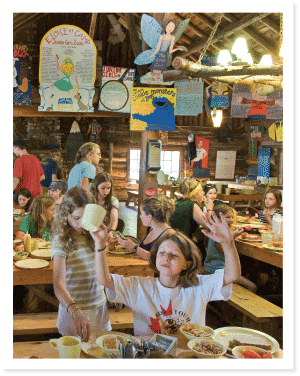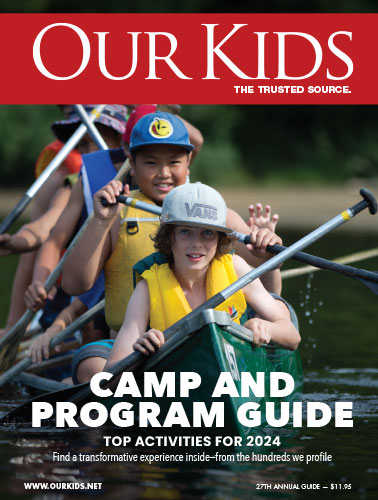The wild child

Description
Ethan, age seven, has been a handful since he took his first steps. He has a high energy level and is easily bored. He has a tendency to get into trouble when he’s not with his brother James. His passion is sports.
Concerns
His parents are worried about him getting out-of-control and that the counsellors won’t be able to deal with him. They wonder whether they should send Ethan and James to the same camp.
Catherine’s Advice
Ethan will do well at a traditional or adventure coed camp, day or residential, where he can constructively expend his excess energy through the many activities. The presence of girls will moderate his boisterous behaviour. His parents can relax. Counsellors know constant attention and activity is needed to keep young campers engaged and out of trouble. Given Ethan’s personality, the director will assign an energetic, outgoing counsellor with his own “bag of tricks” to keep several steps ahead of Ethan. If James attends another camp, he will be free of any obligation to supervise Ethan, which is the job Ethan’s counsellor is trained to do.
The bookworm

Description
Taylor, age nine, loves to read and is a straight-A student. She is shy and has only a few close friends. She enjoys the outdoors but doesn’t play any team sports.
Concerns
Taylor is worried about being away from home for the first time and making friends. She is concerned that she won’t have the “right clothes” or excel at any activities.
Catherine's Advice
Taylor, being shy and apprehensive, could ease into the camp experience by attending a traditional day camp that offers individual activities that she enjoys. With daily lessons in swimming, tennis and maybe riding, her self-esteem will flourish as her skills improve. With the guidance of a caring counsellor, she will soon learn that making new friends and having fun have nothing to do with looks or clothing labels. At camp, comfortable old clothes that provide protection from sun, rain and the occasional chill work best. After a successful season at day camp, Taylor may be willing to try an overnight experience.
The gamer

Description
Jack, 11, seems to spend much of his time playing his Nintendo Wii. His mission for the summer is to get to the next level on his video game. He used to enjoy the outdoors, but now he rarely sees the light of day.
Concerns
Jack resists the idea of leaving his friends and his computer for the summer. His parents hesitate to send him to camp against his will, and worry about his bee-sting allergies.
Catherine's Advice
Jack’s parents need to give him a choice—not whether he will go to camp, but which camp he will go to. Together, they can agree on the parameters, such as location, program and budget. Proximity to a hospital may be a prerequisite given his allergy. Jack may then use his computer skills to surf the web and select a camp that appeals to him. He has to clearly understand that his Nintendo Wii stays at home—but he is making a commitment for a few weeks, not a lifetime. If he approaches the new experience with a positive attitude, with luck, he may become hooked on camp.
The social butterfly

Description
Emma, 12, makes friends easily. She is an average student, but lately seems more interested in music, fashion, and boys. She spends most of her time on the Internet or her cellphone texting/chatting with friends.

Concerns
Her parents grew up in a country where camp wasn’t a part of their culture and resist the idea of Emma spending the summer away from home. They are concerned about her getting into trouble with boys and about her eating properly.
Catherine's Advice
Choosing an all-girls’ camp would suit Emma’s gregarious nature and eliminate her parents’ concerns. Without access to her cellphone or computer, Emma would enjoy chatting face-to-face with her new friends, while participating in worthwhile activities and developing a healthy appetite. Emma’s parents can stop worrying, knowing counsellors are expected to model good eating habits, while encouraging campers to eat a balanced, nutritious diet.
The sports enthusiast

Description
Alexa, 14, loves sports and athletics. She’s never been to camp but is interested in one that would allow her to develop her skills.
Concerns
Alexa wonders whether she might be too old to be a first-time camper. She’s also concerned about leaving her friends, but there’s been some talk of her going to the same place as friends from one of her teams. Her parents are worried about the cost and potential sports injuries far from home.
Catherine's Advice
Alexa will thrive at a residential sports camp. Given her athletic skill and experience, she will fit in easily, despite being a new camper, especially if some teammates accompany her. To allay their concerns, Alexa’s parents should ask the director to describe the health care facilities, the medical staff and the arrangements with the local hospital. As for cost, grandparents may consider contributing as a birthday gift.
Are you searching for the right camp for your child? Camps.ca’s advanced summer camp search allows you to search by specific criteria—a simple way to explore your options.










